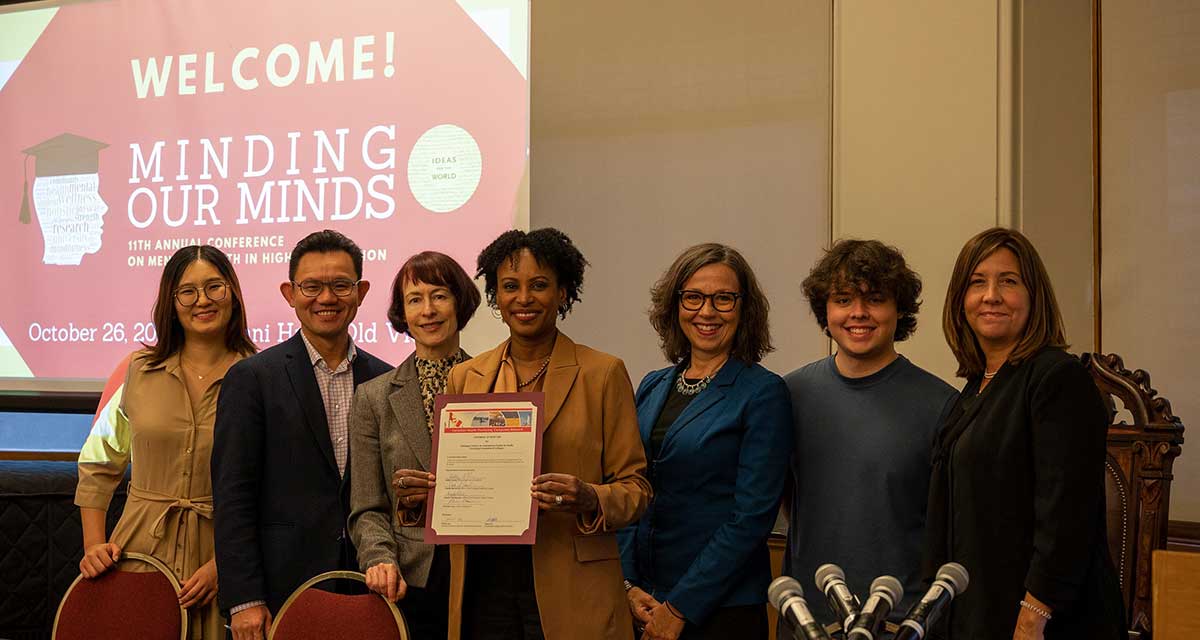Victoria University Signs Okanagan Charter

(L-R) Kacy Lin, Ken Chan, Angela Esterhammer, Rhonda N. McEwen, Pamela R. McCarroll, Shane Joy, Kelley Castle. (Photo by Minh Truong/Victoria University).
PRESS RELEASE
The commitment to the health and wellbeing of its students, staff, faculty and librarians was the impetus for Victoria University in the University of Toronto to adopt the Okanagan Charter. The Charter, which was developed in 2015, calls on post-secondary institutions to embed health into all aspects of campus culture and to lead health promotion action and collaboration locally and globally. The signing took place at the University’s annual Minding our Minds Conference on October 26, 2023, which focuses on mental and cognitive health.
“The idea for adopting the Charter came from students who consistently express the need for health and wellness supports. I am proud of our community, who have already implemented innovative health resources for students, and I believe that we can do even more,” says Dr. Rhonda N. McEwen, president and vice-chancellor, Victoria University.
This year, Victoria University launched a new program that provides peer-to-peer mental health counselling by students studying to be psychotherapists at Emmanuel College, the post-graduate multi-faith theological college at Victoria University. “This is a great example of how we take a very holistic approach to providing health resources for students,” says McEwen.
There has also been additional training for student-facing staff in the Office of the Dean of Students. A new role, Assistant Dean, Student Wellness, has also been added as part of a pilot project focused on mental health wellness programming and services and non-clinical student case navigation and management. “Our office is seeing more complex situations of students reaching out for help. Factors include academic pressures, external pressures such as climate change and other world events, but also, impacts on a generation that was very isolated during their high school years because of the pandemic,” explains Kelley Castle, Dean of Students. “The signing of the Charter sends a clear message that health is a core priority at Vic U. We have a long history of providing robust health resources for students, and I’m encouraged that we continue to see the community as prioritizing this for everyone.”
The commitment to health also extends into the classroom. This year, Emmanuel College developed training for its faculty, its PhD students as teaching assistants, and staff for trauma-informed pedagogy. “Trauma-informed pedagogy acknowledges that the past and current experiences of both students and educators may impact their engagement in our classroom, and that individuals living with trauma possess unique needs and may require special attention. This approach focuses on building relationships, creating a sense of safety and trust, and acknowledging and accommodating diverse experiences and needs,” explains Rev. Dr. HyeRan Kim Cragg, principal, Emmanuel College.
Staff, faculty and librarians across campus were also invited to attend mindfulness and meditation sessions as well as social events through Vic Connect to foster a sense of well-being on campus.
“Every single member of our community deserves to have the opportunity to thrive academically, socially and professionally, and at the centre of all of those things is our health. Victoria University will continue to commit to the health and well-being of everyone who is part of our academic community,” says McEwen.
